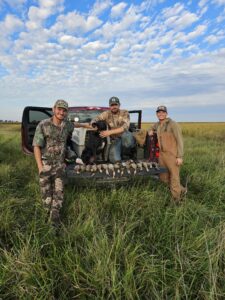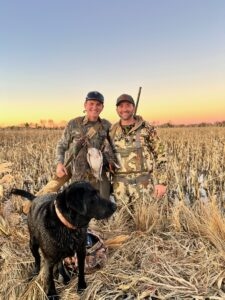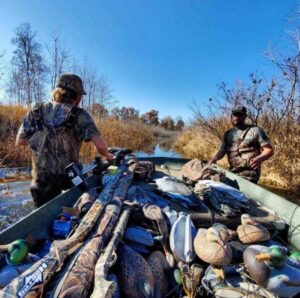How to Find the Perfect Farm for Duck Hunting
 Travis Owen
Travis Owen
Missouri Land Specialist
For many outdoor enthusiasts, duck hunting offers an exhilarating experience. Having your own piece of land for hunting not only gives you privacy but also the freedom to create the ideal hunting environment. But finding the perfect farm for duck hunting requires more than just acreage and a love for the outdoors. Here’s a comprehensive guide to help you find a farm that will be a duck hunter’s paradise.
Location is Everything
When looking for the perfect farm for duck hunting, focus on regions where waterfowl are naturally abundant. Flyways are key migration routes for ducks, and purchasing land in proximity to these areas significantly increases your chances of successful hunts.
In the United States, the four major flyways are:
-
- Pacific Flyway: covers the western states
- Central Flyway: includes the Great Plains and portions of Texas
- Mississippi Flyway: extends from Canada to the Gulf of Mexico, including states like Missouri, Arkansas, and Illinois
- Atlantic Flyway: Covers the eastern seaboard states
Properties located near major rivers, lakes, or wetlands within these flyways are ideal for consistent duck activity.

Water Features and Wetlands
Ducks need water to thrive, and the availability of natural or man-made water sources is crucial. Look for properties with features such as:
-
- Ponds and Lakes: these offer reliable water and habitat for waterfowl
- Sloughs and Wetlands: these provide the shallow, marshy environments that ducks favor
- Streams and Creeks: flowing water attracts ducks and can be enhanced for hunting purposes
If a farm lacks natural water features, consider whether there are opportunities for creating or enhancing wetlands with levees, dikes, or pumps.
Soil Types
Soil quality plays a significant role in maintaining healthy wetlands and food sources for waterfowl. The best duck hunting farms often feature:
-
- Loamy Soil: ideal for planting waterfowl-friendly vegetation like smartweed, millet, and wild rice
- Clay Soil: helps retain water, making it suitable for creating or maintaining wetlands
- Silty Soil: provides fertile conditions for aquatic plant growth
Understanding the soil types on a potential property will help you manage wetlands and ensure long-term success.

Habitat and Vegetation
A good duck hunting farm isn’t just about water – it’s also about the right habitat. Ducks need cover from predators and weather, as well as food sources like seeds and aquatic vegetation. Key habitat features to look for include:
-
- Agricultural Crops: corn, milo, soybeans, and other grains provide excellent food sources during cold weather and offer structure and cover
- Wetland Plants: such as smartweed, wild rice, and millet, which are natural food sources
- Flooded Timber: especially favored by wood ducks and mallards
Additionally, properties with a mix of wetlands, agricultural fields, and hardwood timber are ideal for diverse hunting opportunities.
Knowing Duck Property Types
Understanding the types of duck properties is essential for success. Ducks typically follow a daily pattern with three main stages.
-
- Refuge: where they sleep and stay safe from predators. These are protected, quiet areas with minimal disturbance
- Loaf: areas within a few miles of a refuge where ducks stretch their wings and rest during the day
- Food: places where ducks fly to feed, such as flooded corn fields or managed moist soil areas. While food can sometimes be found in a refuge or loaf, these feeding zones usually have an abundance of high-energy food sources.
Hunting Plans and Creating Your Own Refuge
Having a well-thought-out hunting plan and, if your property is large enough, creating your own refuge can be game-changers for the quality of your hunts. A refuge site offers ducks a safe haven to rest, encouraging them to keep using your property throughout the season. Key considerations for hunting plans include:
-
- Rest Days: designate certain days as rest periods to reduce pressure on the birds
- Number of Hunters: limit the number of hunters on your property to avoid over-hunting
- Rotating Hunting Locations: change hunting locations locations regularly to prevent ducks from avoiding specific areas
These strategies help maintain a healthy duck population on your property and improve the overall quality of your hunts.
Managing Water Flow
Having the ability to remove water from your property is just as important as getting water onto it, especially if you have tillable land. Property drainage helps maintain the health of agricultural fields and ensures you can manage wetlands effectively. Levees, ditches, and pumps can help regulate level for both farming and hunting purposes.
Accessibility and Infrastructure
A perfect duck hunting farm should be easily accessible, especially during hunting season. Consider the following features:
-
-
- Road Access: gravel or dirt roads that remain passable in wet conditions
- Blinds and Pits: existing hunting blinds, pits, or structures save time and money
- Boat Access: if the property has large water bodies, easy boat access can be essential
- Storage: sheds or barns for storing decoys, boats, and hunting gear
-
Waterfowl Refuges
Properties near designated waterfowl refuges can be highly advantageous. Refuges provide safe resting and feeding ares for migrating ducks, increasing the likelihood of consistent duck activity on neighboring lands. Consider properties that are:
-
- Adjacent to or near wildlife refuges: ducks will often move between refuges and nearby
- In regions with protected wetlands: these areas support healthy waterfowl populations
Proximity to refuges can enhance your hunting success and contribute to sustainable waterfowl management.
Hunting Potential and Regulations
Evaluate the hunting potential by asking questions like:
-
- Are there existing duck populations on the property?
- Is there a history of successful hunts?
- Are there neighboring properties that manage waterfowl?
Research local hunting regulations, including limits, seasons, and any wetland protection laws. Properties in conservation-friendly areas often provide long-term sustainability for hunting.
Generating Income from Duck Hunting Properties
Duck hunting properties can be more than just a hunting spot – they can also generate income. Here is how:

-
- Crop Income: Properties with tillable land can produce crops like corn, soybeans, or millet, which not only attract ducks but also provide rental income or profits from harvesting.
- Club Memberships: Turn your property into a hunting club and charge memberships. This provides recurring income while sharing the property’s amenities with fellow hunters.
- Short-Term Rentals: After waterfowl season, during the reverse migration when millions of birds head back north, hunting properties often host massive numbers of unpressured birds. This period is ideal for offering short-term rentals to bird watchers, wildlife photographers, and outdoor enthusiasts. The sheer volume of birds during this time in full breeding plumage and higher numbers makes for breathtaking views and exceptionalexperiences without intruding on hunting opportunities. Even non-waterfowl enthusiasts find the reverse migration a spectacular sight.
- Wealth Storage with ROI: Investing in hunting land is a way to store wealth in a tangible asset while generating a return through experiences. The time spent in the blind with family, friends, or clients builds lasting relationships and creates priceless memories.
By leveraging these opportunities, your duck hunting property can pay for itself over time while providing both financial and personal rewards.
Conservation and Land Management Opportunities
Programs like the Wetlands Reserve Program (WRP) and Conservation Reserve Program (CRP) can help enhance duck habitat while providing financial incentives for landowners. Properties that already participate in these programs may have restored wetlands and managed habitats perfect for hunting.
Wildlife Diversity
While duck hunting may be your primary goal, properties that also attract geese, deer, or turkeys offer year-round hunting and wildlife opportunities. This increases the overall value and enjoyment of your investment.
Work with a Land Specialist
Partnering with a real estate agent who specializes in hunting land, such as a Land Specialist at High Point Land Company, can make a world of difference. Specialists understand the nuances of hunting properties, habitat management, and local regulations, ensuring you make an informed decision.
Finding the perfect farm for duck hunting requires careful consideration of location, water sources, habitat quality, and infrastructure. By focusing on these key aspects and seeking expert advice, you can find a property that offers thrilling hunts and a lasting connection to the great outdoors.
Remember, the right property doesn’t just provide hunting opportunities – it’s a place where traditions are built, stories are shared, and nature is enjoyed to the fullest.

Do you want to learn more?
If you are looking to find your perfect duck hunting farm, reach out to one of the High Point Land Company agents and we will be a guiding partner. For more questions regarding land real estate, visit our YouTube Knowledge Center.
Travis has a wealth of outdoor knowledge from hunting, farming, and dirt work and a passion for helping others succeed no matter what their goals are. From setting up a property for more efficient hunting and a higher likelihood of encounters with target game species, to solving erosion problems with soil conservation efforts, or creating land improvements he is eager to help you every step of the way in your Eastern Missouri land intentions. If you are interested in selling your farmland, call Travis at 573-470-8776 or email him at travis@highpointlandcompany.com.

